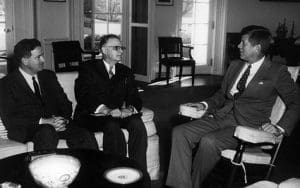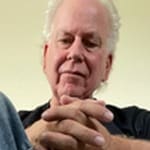Our lives are “Profiles in Courage”
Those of us with emotional and mental illnesses endure more misery than the average Joe or Joan. And it isn’t just the illness – pile on the life-interrupting garbage that comes with it. For my money, our lives are “profiles in courage.”
Incredibly, JFK was administered the last rites of the Roman Catholic Church three times. That doesn’t include the final sacrament and prayers in Parkland Hospital’s Trauma Room 1…
So let’s make a list…
Lost pleasure and motivation, hopelessness, isolation, delusions, panic attacks, social discomfort and dread, hallucinations, obsessions and compulsions – and those are just symptoms of the illness.
To get a panoramic view, let’s add what often comes in the back pocket of those symptoms – medical issues, financial troubles, lost and scarred relationships and families, school failings, work interruption, and more.
For millions of emotional and mental illness sufferers, the misery that invades our existence numerous times on any given day is exhausting and disheartening. And somehow, some way, we move on with our lives.
Absolutely, profiles in courage.
John Fitzgerald Kennedy
I’m guessing you know the man in our featured image is John Fitzgerald Kennedy (JFK), the 35th President of the United States. He’s at the wheel of the Coast Guard Yacht “Manitou” on Narragansett Bay, Rhode Island in 1962.
Even if one doesn’t appreciate his politics and some of his personal behavior, he really was a shining light in so many ways.
JFK will always be a fixture in my mind because, as a boy, I was deeply impacted by the potentially world-ending Cuban Missile Crisis as well as his assassination. The latter was a “do you remember where you were” event.
Profiles in Courage
In 1957 JFK wrote the Pulitzer Prize winning book, Profiles in Courage. It’s a collection of short bios of eight United States Senators, highlighting their bravery and integrity.
Of course, JFK, a Senator at the time, wasn’t going to include himself. But given the tremendous challenges he endured throughout his life, he met the criteria.
I believe the same applies to those of us with emotional and mental illnesses.
John F. Kennedy’s suffering

Frequently in his rocking chair because of chronic low-back pain
As we approach the adversity JFK faced, we’re going to limit our discussion to his medical woes.
Excruciating low-back pain
JFK lived with near-constant excruciating low-back pain. It’s thought to have originated in his college years, and exacerbated during the destruction of the PT boat he commanded in World War II. Questionable treatment, including surgeries, only made matters worse.
Notice he’s sitting in a rocking chair above. It was one of his only means of staying relatively comfortable. And he wore a heavy, corset-like brace that extended from his chest to below his waist.
Autoimmune polyendocrine syndrome
JFK suffered from autoimmune polyendocrine syndrome type 2 (APS-II), which generated his hypothyroidism and Addison’s disease.
The Addison’s had to be closely monitored, not just to manage troubling symptoms, but to keep it from killing him. That meant injections of hydrocortisone and testosterone. Add to that his use of antispasmodic drugs to keep his chronic colitis and diarrhea at bay. And then there were those pesky UTIs.
The last rites
Incredibly, JFK was administered the last rites of the Roman Catholic Church three times. And that doesn’t include the final sacrament and prayers in Parkland Hospital’s Trauma Room 1 after being mortally wounded in Dallas, Texas on November 22, 1963.
What’s his suffering to us?
I’m sure you noticed that nothing’s been said about JFK having an emotional or mental illness. As far as I know, he didn’t. But it doesn’t matter, because the impact of the medical load JFK carried is no different than that of the tonnage we tote around.
And let’s not forget that our circumstances are medical in nature.
The Cuban missile crisis
The Cuban missile crisis began on October 16, 1962. Stating that the nuclear destruction of the United States and Soviet Union – much of the world, for that matter – was at stake isn’t hyperbole.
For thirteen days JFK and his national security team worked virtually around the clock to, well, save the world.
Here’s just one of the observations about JFK in the midst of the crisis: “He is bone tired, running on a hidden reserve of energy. His aching body is in a state of chaos.” By the way, does that feel familiar?
His wife, Jacqueline Bouvier Kennedy, had no idea how much longer JFK could go on. She noticed how awkwardly he slid himself into his rocking chair. And she remembered how his Addison’s disease almost killed him fifteen years earlier. She also recalled how a coma-inducing post-back surgery infection almost took him. Seriously, how much did he have left?
But with tenacity, he pushed back and continued forward motion. Had he retreated to his bed, which would have been understandable, it really could have meant the end of the world.
Again, does any of this feel familiar?
Will you believe the same?
Look, I’m not going to hit you with the “If he can do it, so can we.” bit. That’s too easy, too cliche. Besides, it’s more than just that…
Given what those of us with an emotional or mental illness endure – day after day – we need to identify with people who suffer – move forward and thrive. What better model than John Fitzgerald Kennedy.
I believe his life is a profile in courage, just like each of ours. Will you believe the same?
A portion of what I’ve shared, including the only quotation, comes from an outstanding book, Killing Kennedy: The End of Camelot, by Bill O’Reilly and Martin Dugard. If you’re into bios and history, the “Killing…” series is superb.
Those Chipur info and inspiration articles: review all of the titles or by category below.
Images: public domain


After a decades-long battle with panic, generalized anxiety, fluctuating moods, and alcohol dependence; Bill finally found his life’s passion and work – lending a hand to those in the same boat. At age 49 he hit grad school and earned his counseling credentials. And he continues his service through Chipur and other projects.



